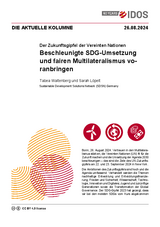The Current Column
The United Nations Summit of the Future
Accelerating SDG delivery and promoting fair multilateralism
Löpelt, Sarah / Tabea WaltenbergThe Current Column (2024)
Bonn: German Institute of Development and Sustainability (IDOS), The Current Column of 26 August 2024
Read the English PDF-Version here.
Bonn, 26 August 2024. Boost trust in multilateralism, get the United Nations (UN) fit for the future and accelerate the implementation of the 2030 Agenda – these are the goals of the UN Summit of the Future taking place on 22 and 23 September 2024 in New York.
Its ambitions are high and its agenda is extensive: the issues on the table are sustainable development and development financing; peace and security; science, technology, innovation and digitalisation; youth and future generations; and the transformation of global governance. The 2023 SDG Summit showed that we are off track on most of the SDGs, a situation that is exacerbated by the impact of the COVID-19 pandemic, debt, wars and geopolitical rivalries. In view of this, what will the Summit of the Future have to deliver?
Fair financing for sustainability
The Summit of the Future will need to introduce additional steps to the process of reforming the international financial architecture. Global financial institutions and multilateral development banks must attach even greater priority to the protection and provision of global public goods while at the same time ruling out all funding of fossil fuels. The aim of the reform process should not only be to achieve more effective management of current and future challenges but also ensure long-term SDG financing. Here, it will also be vital to boost the transparency and accountability of institutions. In addition, more must be done to strengthen the representation and co-determination rights of low- and middle-income countries (LMICs) in the World Bank and International Monetary Fund. In addition, 48 LMICs spend more on debt repayment than on healthcare (UNCTAD 2024), so progress has to be stepped up on the issue of multilateral debt cancellation. The Summit of the Future needs to set out a clear path here to lay the foundations for the UN Financing for Development Conference 2025.
No sustainable development without peace
The review of the implementation of SDG 16 (peace, justice and strong institutions) at this year’s High-Level Political Forum on Sustainable Development (HLPF) demonstrated clearly that progress in these areas will be a game changer for achieving all the SDGs (UNDP and IDOS 2024 for SDG 13). Sustainable development is not possible without peace, as studies based on the example of Yemen show (UNDP 2020). Both at the Summit and in the course of the follow-up process, much more has to be done to recognise the systemic importance of SDG 16 and translate this into practical measures – such as crisis prevention – by promoting democracy and the rule of law (including an independent judiciary). Furthermore, civil society worldwide should be recognised as the “backbone of the 2030 Agenda”, and measures must be taken to counteract the increasing restrictions on civil society activity. The extent to which access of international civil society to the Summit of the Future is subject to local restrictions is a cause for concern (IISD 2024).
Preserving the foundations of life for future generations
Our actions have far-reaching consequences for young people and future generations. The Summit of the Future must be consistent in placing these groups at the centre of its concern. Sustainable development means satisfying the needs of the present in such a way that the opportunities of future generations are not restricted. The requirement for this is to preserve the ecological foundations of life. Sub-goal 8 (sustained economic growth) is still a prioritised political means of delivering the 2030 Agenda, even in saturated economies, yet this counteracts the achievement of numerous SDGs, in particular the ecological SDGs 13 (climate), 14 and 15 (life under water/on land). The Summit of the Future should discuss ways of reshaping SDG 8 in favour of a more differentiated understanding of growth depending on the region and sector, greater independence of social systems from growth, and concepts of sufficiency. Measuring progress in a way that goes beyond gross domestic product is an important step here.
A summit alone will not result in the reforms under discussion being implemented. However, it can contribute to more effective interlinking of multilateral sustainability-oriented processes (including the 2030 Agenda, Paris Agreement, Kunming-Montreal Biodiversity Framework, World Bank reform, G20). A well-structured follow-up process that involves civil society actors will be especially crucial to success. What we do in Europe and Germany in the coming years will be essential, too. The new EU Commission should align its work more closely with the 2030 Agenda. In a world marked by conflict and mistrust, this is one of the few systems of goals that is commonly agreed on. Germany should make the most of the Voluntary National Report (VNR) in 2025 on accelerated SDG implementation to present concrete measures designed to achieve the Summit’s goals.



